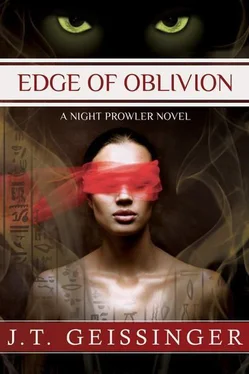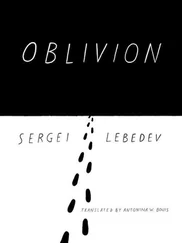Edge of Oblivion
Night Prowler - 2
by
J T Geissinger
To Jay, my husband, boyfriend, business partner, and best friend. The best part of every day is opening my eyes in the morning and seeing
you there
To Jay, my husband, boyfriend, business partner, and best friend. The best part of every day is opening
my eyes in the morning and seeing you there.
What judgment pronounce you upon him who though honest in the flesh is a thief in spirit?
What penalty lay you upon him who slays in the flesh yet is himself slain in the spirit?
And how prosecute you him who in action is a deceiver and an oppressor,
Yet who also is aggrieved and outraged?
And how shall you punish those whose remorse is already greater than their misdeeds?
KHALIL GIBRAN
Once, we were gods.
Ages ago, idyllic, uncounted centuries before man or his sly, sprawling civilizations had even been dreamed, we ruled sovereign over all other creatures in the deepest, virgin heart of equatorial Africa. Divine and resplendent, reveling in the bounty and glory of our many Gifts, we took the name Ikati —Zulu for “cat warrior”—because it most closely described our stealthy perfection, our feline, sinuous grace, our cunning and lethal prowess.
We lived and loved and raised our children there, beside the pristine, glimmering waters of the Congo, beneath the nourishing sun and the endless blue sky and the lush, dappled shade of the baobab trees. We wore crowns of gold and garnet and tanzanite; we walked naked among nature and one another and knew no shame. We honored our dead and hunted our food and slept in the fat, crooked arms of acacias and marulas; we passed the stories of our illustrious history to the next generation. We celebrated our Mother Earth and her great magic, and all was well. All was perfect.
But Time is a merciless thief, even for creatures so blessed as we, and slowly things began to change.
Invaders came. Clumsy, ugly, two-legged beasts with spears to stab hearts and arrows to pierce flesh and fire to burn homes. They stole through our forests and poached in our grasslands; they poisoned our rivers and captured our children, our old and weak. We fought our enemies back; we had no choice. Year after year we fought, decades of struggle, war, blood, death. Battles were won, only to begin anew with the next generation. There were so many of our enemy, and so few of us. In time, our numbers dwindled. In time, our enemies gained the advantage.
So, like all creatures must, we adapted to survive.
We learned the human ways. We spoke the human tongue. We wore human clothing and raised human crops and built homes of mud and grass, then wood, then brick, as they did. We learned to hide our true nature. And in this way, we began once more to thrive.
In secrecy. In silence. With seething hatred in our hearts.
Then one day came a different sort of man, a man with no spear or sword, a man with open arms and a gentle voice who claimed to be our friend. He offered a truce and the return of what was already rightfully ours, the rivers and the mountains and the verdant, untouched forests. Trust me , the man said, and, tired of so much war and bloodshed, we did.
For a long, long while, the arrangement suited us both and we prospered. Our children grew up together. Our clans lived side by side. Because we were so beautiful and Gifted, unfixed as they were in a single aspect of flesh and bone but mutable, pliable, evanescent, the two-legged invaders began to worship us as the gods we truly were. Offerings were made, statues of gold and ebony and oiled stone were carved, temples were built—the Sphinx, most famously—all in our name. We even mated with our former enemies, bearing half-Blood children, offspring that might one day be as Gifted and blessed as the pure-Blooded were.
Or might not.
A Queen arose from one of these unions. Cleopatra, she was called, meaning “the glory of her father,” because he was Ikati , one of our own Blood. More beautiful and cunning and sensual than us all, she ruled empires and seduced hearts and convinced a human man to turn against his king. And with that, she sealed all our fates.
The coup failed. The Queen and her lover died. And the Ikati were hunted once again. We were hated. We were driven out of our homeland, nearly extinct.
The few that remained remembered how they had survived before the human pestilence came, before clever deceptions blinded their eyes and stole their glory, and made a pact to return to the old ways of pretending and lying, of keeping to themselves. They fled their beloved Africa and found other places in the world to call their own, small, wooded places, cloaked in silence, far away from prying eyes.
Untold eons have passed, and still we live in secrecy and silence, bound together by honor and betrayal and a tradition of ironclad rules to protect us from the greatest threat of all: forgetting.
Our kingdom of peace and perfection was stolen from us by you , covetous, ambitious, treacherous Man. And though we have learned to live alongside you, though we have learned to survive, though we may smile and nod as we pass you in the street, we are always, always ready to eat out your hearts.
Beware.
Certification of Assembly Resolution No. 218.4.9 Dated this 12th day of July, 20 —
Concerning the legal disposition of Morgan Marlena Montgomery, senior Assembly member, Sommerley colony, Hampshire, UK, accused of high treason, criminal accessory, et al.
RESOLUTION AUTHORIZING EXECUTIONWHEREAS, the above-named Assembly member has been accused of and pleaded guilty to the following:
1. High treason
2. Criminal accessory
3. Assault with intent
4. Hate crimes
5. Mayhem
6. Terrorism WHEREAS, the punishment for each of these crimes individually or in plurali according to the Law and common practice is death, WHEREAS, we, the undersigned Assembly members, in a unanimous vote do find the defendant guilty of all charges, THEREFORE, be it resolved the accused shall be executed. Punishment will be carried out immediately upon recording of this document.
IN WITNESS WHEREOF, I have ascribed my name and affixed the seal of this Assembly on 12/7/20
—
Edward, Viscount Weymouth KEEPER OF THE BLOODLINES
Nathaniel quickly descended the narrow, twisting wood stairs to the underground holding cells, a large flashlight gripped in one hand, an electric cattle prod in the other.
It was cold and dank, the pitch black unbroken except for the narrow wedge of his flashlight’s yellow beam. The stairs had been built long ago—nearly two dozen generations of the Alpha’s ancestors had inhabited the manor since—and they creaked in loud protest underfoot. His steps disturbed a choking cloud of dust and small, unseen creatures that went scurrying away to disappear into cracks in the rough stone walls, slick with moss and moisture. A cobweb drifted by, ghostly pale strands that lifted to brush his face. Somewhere far off—below?—he heard the muffled sound of flowing water.
He almost lost his footing on an uneven step, then regained his balance and, scowling, nervously pushed an errant lock of brown hair from his eyes. He didn’t want this errand, was loath to do it, if truth be told, but he’d only today been voted in to fill the empty Assembly seat and was not in a position to say no. He’d just have to get it over with as quickly as possible and put the whole nasty business out of his mind once it was done.
He hated executions. The blood. The screams. The cold, unsmiling faces gathered to watch it all. A necessary evil, but he wished they’d been able to make an exception for her .
Читать дальше












